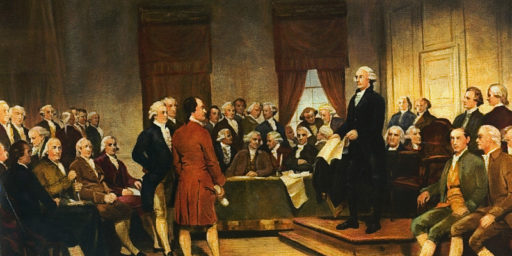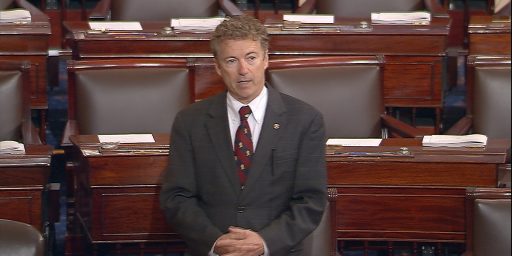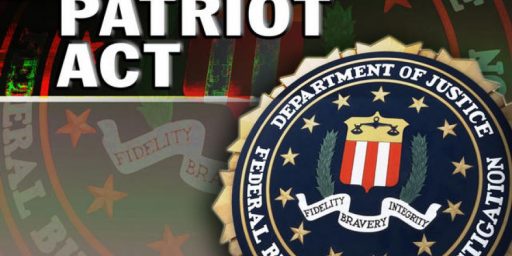Patriot Renewal
Jim Carafano and Paul Rosenzweig urge the renewal of the Patriot Act.
Nothing is more important than preventing another catastrophic terrorist attack on Americans. Nothing. That is why the 9/11 Commission’s work—a comprehensive, objective review of how our law enforcement and intelligence operations can be improved to prevent a recurrence—is so vital. Whenever a team loses the game, it always reviews the videotape to see how it can improve.
During a recent public hearing of the 9/11 Commission, present and former government officials and even the Commissioners themselves emphasized the importance of one new tool adopted after September 11: the USA Patriot Act. They all agreed that the Patriot Act is an essential weapon in the nation̢۪s global war on terrorism. Congress should take note and, as President Bush called for in the State of the Union Address, act now to reauthorize provisions in the law due to expire next year.
***
One key discussion point, in particular, should not be lost. Officials from both administrations acknowledged that before September 11 a “wall†of legal and regulatory policies prevented effective sharing of information between the intelligence and law enforcement communities. For example, as Attorney General John Ashcroft noted, in 1995 the Justice Department embraced legal reasoning that “effectively excluded†prosecutors from intelligence investigations. At times, for prudential reasons, Justice Department officials even raised the “wall†higher than was required by law, to avoid any appearance of “impermissibly†mixing law enforcement and intelligence activities.
We now know that the erection of this “wall†had tragic costs. The “wall†played a large role in our pre-September 11 inability to “connect the dots†of intelligence and law enforcement information. As one frustrated FBI investigator wrote at the time, “Whatever has happened to this—someday someone will die—and wall or not—the public will not understand why we were not more effective and throwing every resource we had at certain ‘problems.’â€
Largely in response to these problems, Congress passed the USA Patriot Act in the wake of the September 11 attacks. Though often derided by its detractors as a knee-jerk reaction to the September 11 tragedy, the law represented reforms that, as witnesses before the commission correctly noted, had long been needed to improve U.S. counterterrorism efforts.
***
Safeguarding the civil liberties of American citizens is vitally important, as important during war as during periods of peace. But so too is preserving our security. For, as Thomas Powers has written, “In a liberal republic, liberty presupposes security; the point of security is liberty.†The Patriot Act preserves both. Hysterical criticisms that the Act was unnecessary and is a threat to a healthy civil society have proven unfounded, and calls for repeal or significant revision are just wrongheaded.
Clearly, we’ve learned that the barriers to intelligence sharing among the myriad bureaucracies in our government can have catastrophic consequences. It is also clear that some provisions of the Patriot Act have infringed upon civil liberties with virtually no increase in security. There is no reason why this must be an all-or-nothing decision. We can either renew the Act, removing the incidental portions that have proven problematic or pass a new bill which continues to break down “the wall” but without the portions which suspend the basic rights of those mildly suspected of terrorist ties.






“It is also clear that some provisions of the Patriot Act have infringed upon civil liberties with virtually no increase in security.”
How is this at all clear? I have yet to see any evidence of a single infringement upon civil liberties that can be properly attributed to the Patriot Act.
“Nothing is more important than preventing another catastrophic terrorist attack on Americans. Nothing.”
Beg to differ.
Our individual freedoms are more important than this. And large sections of the Patriot Act infringe upon those freedoms — needlessly and with little or no enhancement of our national security.
I know of which I speak. I am an attorney who deals daily with certain of the financially oriented provisions that require secret reports to government agencies, unknown to customers… these provisions are, among other things, vague, overbroad, and likely an unconstitutional delegation of governmental duty to private financial institutions.
We have a mighty nation of 300 million people. We lose a couple thousand and we cower in fear, ready to shred the Bill of Rights?
Yes, take prudent safeguards. But let’s avoid the police state.
Jefferson had a comment on such cowardice: “A society that will trade a little order for a little freedom will lose both, and deserve neither.”
—